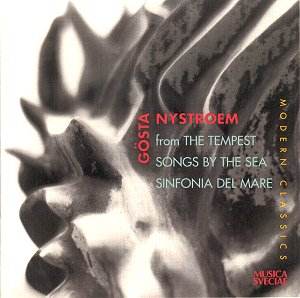Gösta
NYSTROEM
(1890-1966)
The Tempest Prelude (1934)
Songs by the Sea (1943)
Sinfonia del Mare
(1948)
 Charlotte Hellekant
(mezzo)
Charlotte Hellekant
(mezzo)
Swedish Radio Choir (female section)
Swedish RSO/Evgeny Svetlanov
rec Berwaldhallen, Stockholm, 4-5 Dec 1997 (Del Mare); 10-14 Jan
2000
Musica Sveciae Modern Classics
series
 PHONO SUECIA PSCD 709
[71.20]
PHONO SUECIA PSCD 709
[71.20]
www.mic.stim.se
Crotchet
Amazon UK Amazon US

Wonderful! The first Nystroem disc since BIS and Paavo Järvi produced
the viola concerto. This one deserves every success. It presents Nystroem
the Nordic singer and marine poet. In the symphony he catches the murmuring
miles and sea sorrow better than most.
Nystroem's Tempest prelude is just as onomatopoeic as the Sibelius
but with a harshness and stridency magnified by the siren contrast of a
vocalising female choir. The prelude is extravagant with resources using
a wordless choir and a wind machine. The choir combines the qualities of
Debussy's Sirènes with Holst's Neptune. There are some
hugely Baxian convulsions along the way, a priapic trumpet (6.54) and a regretful
swansong for the principal oboe. This is the prelude's first ever recording.
In all three works the sea is unequivocally a player and motivator. The
Songs By the Sea have been well recorded before on Swedish Society
Discofil though again age tells so far as sound quality is concerned. The
work is a cycle for mezzo and orchestra. While the middle movement dances
on a Nordic sward beside the sea the four outer songs lovingly reflect in
icy and dazzlingly sharp focus the unhurrying swell of the sea, the rocking
motion of the waves (3.20 in Nocturne) and their counterpoint with
human love. This is true music of the sea not, as in the case of Rubinstein
and Raff, music that has sea titles attached to notes that could just as
easily celebrate a woodland stroll.
The greatest interest focuses on the Sinfonia del Mare. Of the three
versions I have heard this is the best recorded; stunningly so. Catch the
gruff bark of the trombones and the sheeny moonlit strings. Peerless. The
Tor Mann version on the old Dial LP is very fine. The Westerberg, still available
on Swedish Society Discofil, has Söderström in gloriously fresh
voice must take pride of place but its analogue recording is almost 30 years
old and though its pastel edge-softened approach is so apt to the music it
cannot compare at an audio-technical level with Svetlanov's.
Svetlanov is an inspirational conductor and I have high regard for his work
especially his Tchaikovsky. A recent Harmonia Mundi Khachaturyan collection
is provocative and full of challenging life. Here, however, he relaxes more.
The precision and lunge of the ensemble as found in Westerberg is eluded
though by the finest of shadings. Svetlanov's soprano though she is very
good indeed is not the equal of Söderström who manages to suggest
girlish vulnerability alongside the elemental strength of the sea. Hellekant
has more of a dark chesty shading to her voice.
By the way this is one occasion where I must depart from Robert Layton's
judgement. I know that he finds (I speak from memory) Del Mare formless
and vapid. For me this work catches the essence of the striding, whispering,
glimmering sea sorrow - a hyper-romantic work startlingly inspired not by
Northern seas but by time spent in the Mediterranean. Not all that unusual:
Peterson-Berger, Nielsen and Sibelius each wrote some of their finest music
looking out on that warm ocean.
Which way to jump? For most listeners I would commend this disc. The balance
between the three works is perfect. Here is Nystroem at his most accessible.
No matter how much I call out for CDs of the Sinfonia Tramontana,
Sinfonia Shakespeariana and Violin Concerto (and they must come) those
works with their oblique language and avoidance of immersed tunefulness will
not win Nystroem immediate new friends.
This disc is superbly recorded and if you are to have one collection of Nystroem
this must be it. Everything is clear and registers boldly and with poignancy.
Connoisseurs will however still want the Westerberg version of the symphony.
Rob Barnett

